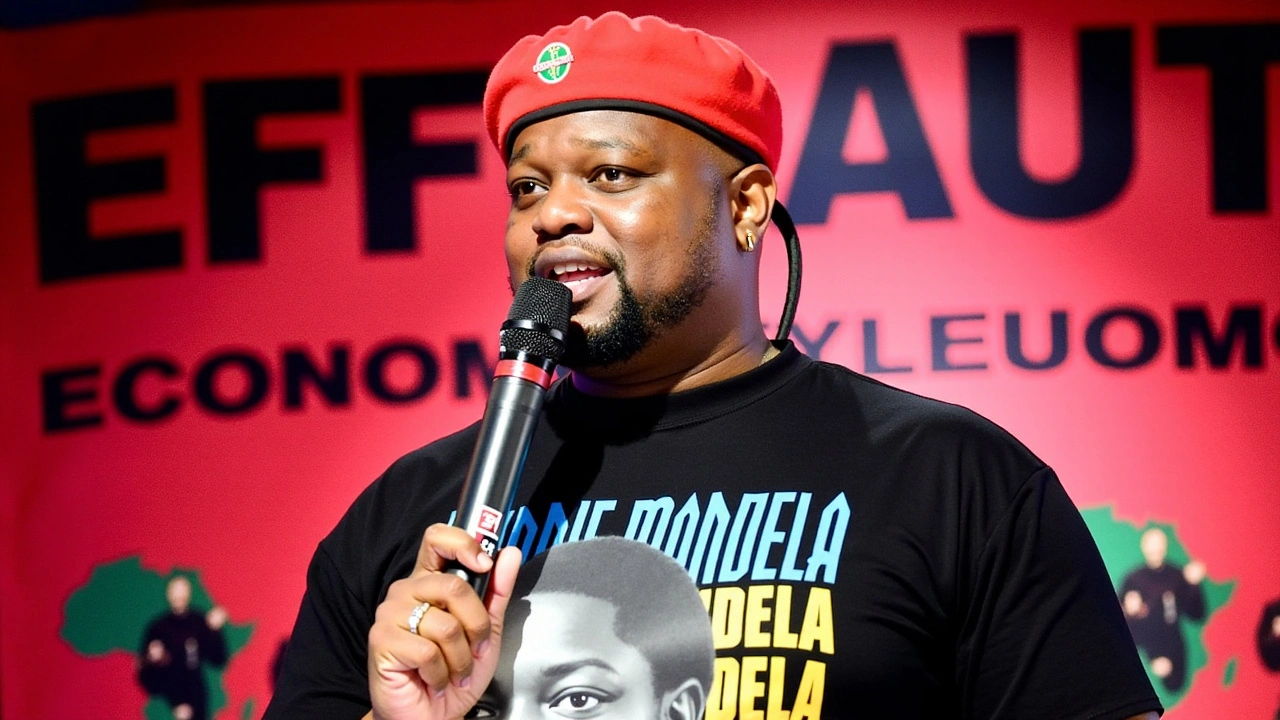Floyd Shivambu's Resignation Sends Shockwaves Through EFF and South African Politics
In a dramatic turn of events, Floyd Shivambu, the Deputy President of the Economic Freedom Fighters (EFF) and a long-serving Member of Parliament, has announced his resignation from both the party and his parliamentary position. The announcement came during an urgent press briefing held at the EFF's headquarters in Johannesburg, catching many by surprise and stirring significant political discourse across the country.
Shivambu, a pivotal figure in the EFF's formation and growth, revealed his decision amid growing tensions with the party's leader and his long-time political comrade, Julius Malema. The fallout between the two leaders, once seen as an unbreakable duo in South African politics, has been the subject of much speculation over recent months. Shivambu's departure marks a critical juncture for the EFF, especially given its proximity to the party's third elective conference scheduled to take place in a few months.
During the press briefing, Shivambu expressed mixed emotions but underscored his commitment to the values he fought for within the EFF. “Leaving the EFF is not an easy decision, but it’s a necessary one for me at this stage,” he stated with palpable sincerity. His announcement of joining the MK Party, a political group associated with former President Jacob Zuma, signifies not just a shift in his political alignment but also hints at the larger dynamics and realignments within South African politics.
The Economic Freedom Fighters, co-founded by Shivambu and Julius Malema in 2013, quickly established itself as a formidable force in the national political landscape. With its radical policy propositions and fervent advocacy for economic emancipation, the EFF galvanized a substantial supporter base, particularly among the youth and marginalized communities. Shivambu's role in the party was instrumental, not just as a deputy president but as a key strategist and policymaker.
Political analysts have been diligently dissecting the implications of Shivambu's move. Many view it as a culmination of a protracted rift between him and Malema, with differences over strategy, leadership style, and the party’s future direction becoming increasingly irreconcilable. Dr. Sibusiso Moyo, a prominent political analyst, posits, “While both Shivambu and Malema have always presented a united front, there have been underlying ideological and tactical disagreements that have percolated over time.”
The timing of Shivambu's exit is particularly significant. With the EFF's elective conference on the horizon, the party was gearing up for critical discussions on its leadership and policy direction. Shivambu’s absence from these discussions could lead to substantial shifts within the party's internal dynamics and potentially its external strategies. The conference, intended as a platform for consolidation and forward planning, now faces the added challenge of addressing the vacuum left by one of its chief architects.
Shivambu’s decision to join the MK Party also opens up new avenues for understanding the current state of alliances and political currents in South Africa. The MK Party, known for its association with Jacob Zuma, evokes a complex mix of support and controversy. Shivambu's alignment with this group could be interpreted as a strategic move aimed at leveraging the historical and populist appeal that Zuma continues to wield in certain quarters. The MK Party, for its part, stands to gain significantly from Shivambu’s political acumen and experience.
Despite his resignation, Shivambu has not completely ruled out a return to the EFF in the future. Such an open-ended conclusion adds an intriguing element to this political saga. “My journey with the EFF has not necessarily ended; I remain committed to the cause of economic freedom, irrespective of my current political abode,” Shivambu remarked. This statement has left many speculating about the conditions under which he might consider a comeback and the potential future scenarios for both Shivambu and the EFF.
The reaction within the EFF to Shivambu’s decision has been one of uncertainty mixed with resolve. In an official statement, Julius Malema acknowledged the contributions of his former deputy and emphasized the party’s determination to stay the course. “Floyd has been a brother in arms, and we value all that we have built together. The EFF remains steadfast in its mission and will continue to push for the economic liberation of our people,” Malema remarked.
Party members and supporters have expressed a range of emotions, from disappointment and frustration to cautious optimism about the EFF’s resilience. In grassroots meetings and online forums, the discourse has been vibrant, reflecting the broad spectrum of opinions within the party’s base. For many, Shivambu’s departure is seen as a painful but potentially galvanizing moment, an opportunity to reassess and perhaps reshape the movement’s strategies and priorities.
The Road Ahead for the EFF and Floyd Shivambu
As the dust begins to settle on Floyd Shivambu’s resignation, the focus shifts to the future trajectories of both the man and the movement he leaves behind. For the EFF, navigating this transitional period will be paramount. The upcoming elective conference will serve as a critical juncture, offering the party a chance to consolidate its leadership and articulate a clear, cohesive vision moving forward. The influence of Malema will undoubtedly be pivotal in this process, but so too will be the collective will of EFF members to adapt and innovate in light of the new realities.
Shivambu, on the other hand, embarks on a new chapter within the MK Party. His integration into this political entity will be closely watched, with many speculating on the specific roles and responsibilities he might assume. Given his track record in political strategy and grassroots mobilization, Shivambu is expected to play a significant role in shaping the MK Party’s agenda and expanding its influence.
Broader implications for South African politics are also worth considering. Shivambu's move could trigger further realignments and shifts within the political landscape, as other leaders and parties recalibrate their strategies in response. The interplay between the EFF, MK Party, and other political actors will likely evolve in new and unpredictable ways, reflecting the dynamic and often volatile nature of South African politics.
For now, the story of Floyd Shivambu’s resignation from the EFF remains a focal point of discussion, raising fundamental questions about leadership, loyalty, and the future of progressive politics in South Africa. Whether this marks the end of an era or the beginning of a new one is yet to be seen, but one thing is certain: the ripples generated by this decision will be felt for quite some time.






Write a comment